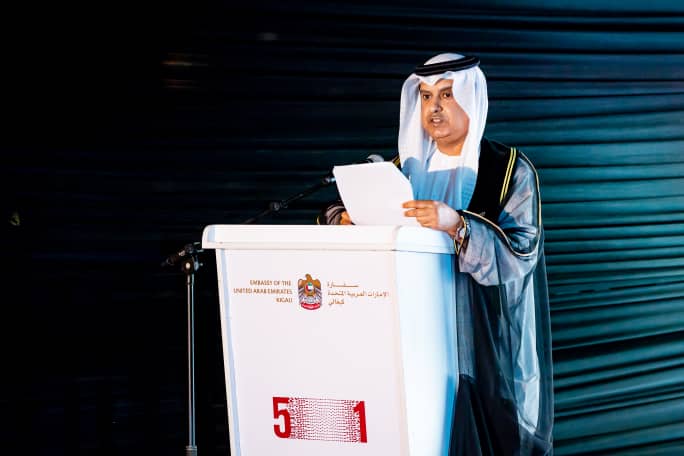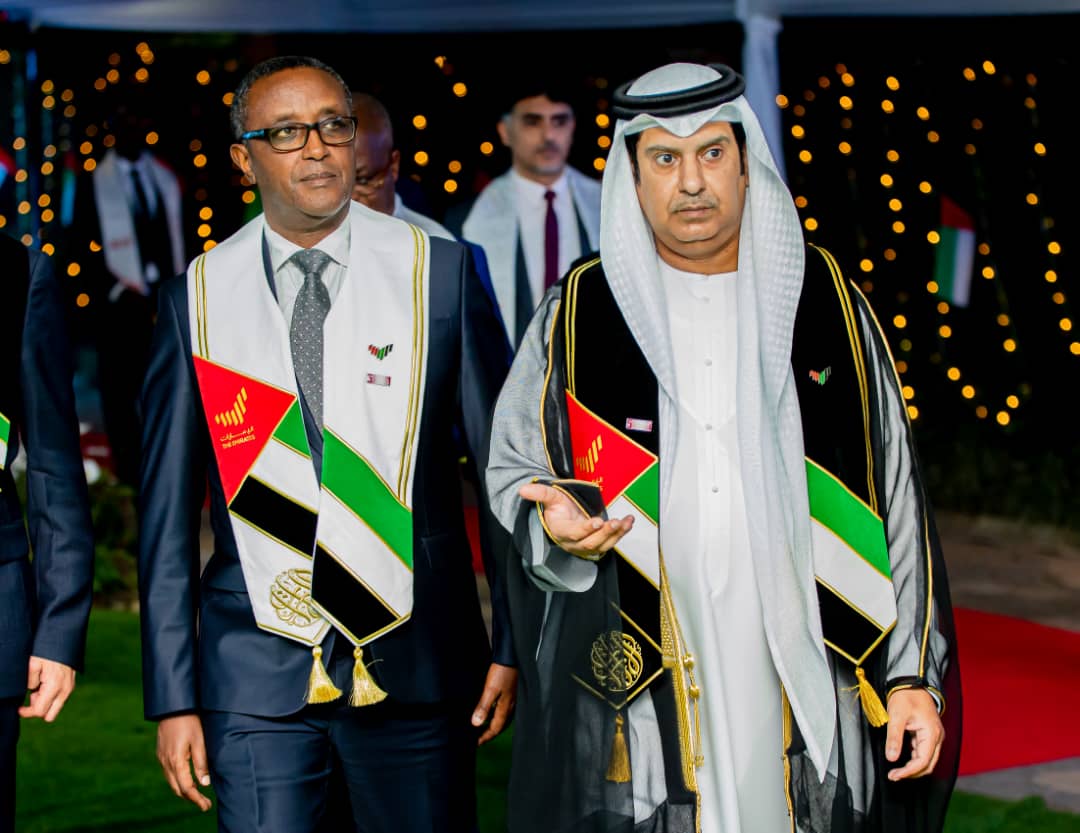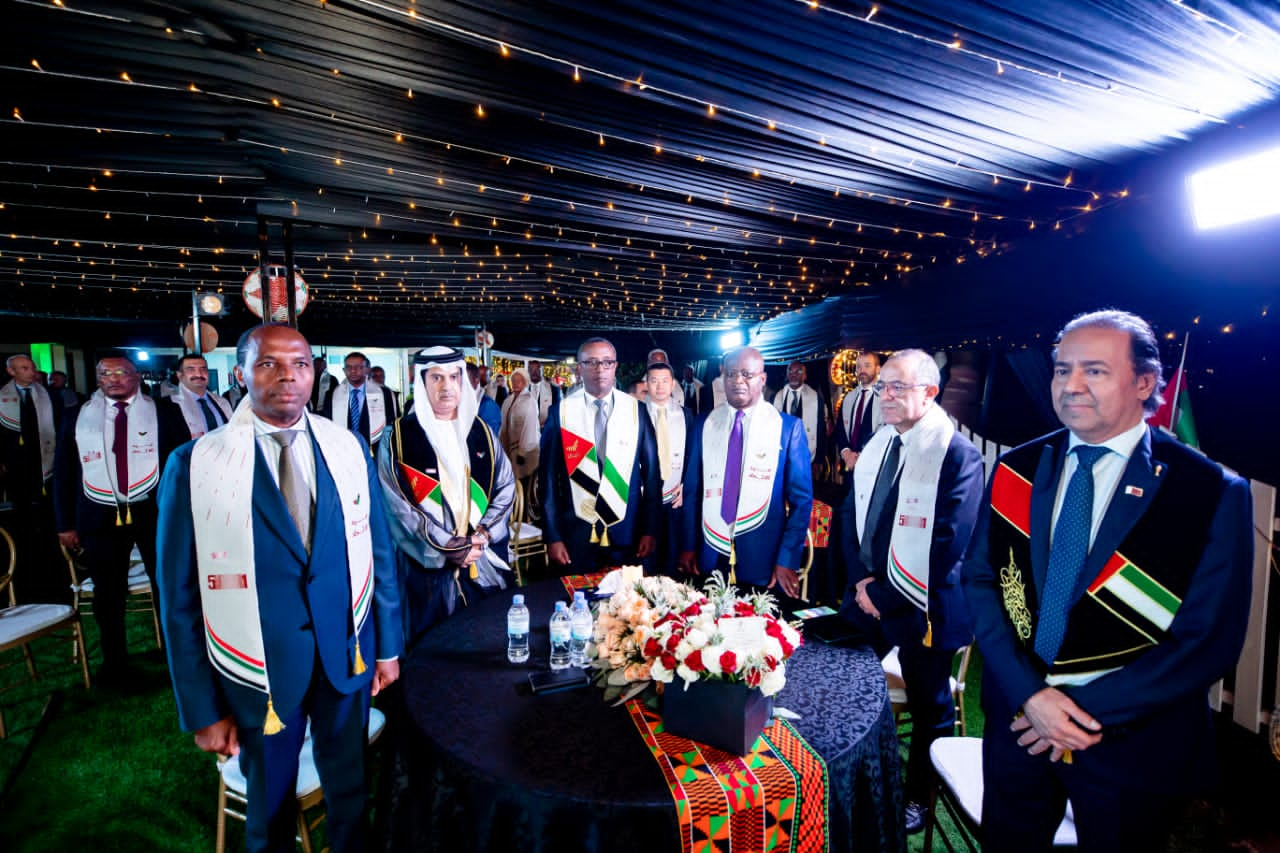
Ambassador Hazza Alqahtani delivering his speech.
UAE Embassy in Kigali yesterday commemorates 51st Union Day of the Nation, and Ambassador Hazza Alqahtani said Trade and Investment remain as key pillars for Rwanda and the UAE cooperation. Read below his speech:
Yearly, we commemorate the establishment of the United Arab Emirates, an occasion that marks a sincere reflection of the federation’s journey rich in monumental events and achievements, building on the foundation that was first laid down by the late Sheikh Zayed bin Sultan Al Nahyan and his brothers, the fellow founding fathers.
Since its foundation on December 2nd 1971, the UAE has followed the principle of promoting security, peace and sustainable development in various parts of the region and the world. Through his vision, the late Sheikh Zayed bin Sultan Al Nahyan – may his soul rest in peace – guided the UAE towards the adoption of a successful and active foreign policy based on balance, moderation, and non-interference in internal affairs of other countries, in acknowledgement of the role Page 2 of 6 and responsibility the UAE holds at regional and international levels. Today, His Highness Sheikh Mohammed bin Zayed Al Nahyan, President of the UAE, follows in his footsteps, leading our nation in its journey towards the future.
In 2021, the UAE announced the “Principles of the 50″. These are ten principles that act as guidelines for all institutions in the UAE since the country began a new phase of growth and development over the next 50 years. The “Principles of the 50” document sets the strategic roadmap for the UAE’s new era of economic, political, developmental, and social growth to strengthen the union, build a sustainable economy, and harness all possible resources to create a more prosperous society.

With Minister Dr Vincent Biruta, Rwandan Minister of Foreign Affairs and Guest of honor
The UAE adopted economic strategies that stimulate economic diversification away from oil, and the country is working to build an economy based on knowledge and diversity, reinforced by scientific and technological progress. The UAE has launched a package of strategic projects and initiatives within the “Projects of the 50”, which aim to establish an advanced stage of internal and external growth. The projects provide impetus for investment in digital and circular economies, as well as sectors based on artificial intelligence and the Fourth Industrial Revolution.
The UAE has begun to conclude comprehensive economic partnership agreements with strategic partners, as part of a long-term strategy in its path of economic diversification and the development of strong international partnerships through trade, industry and investment. Three agreements have been concluded with India, Indonesia and Israel, and will be signed with a number of other countries.
The UAE believes that the future of regional security depends on strong multilateral partnerships and a common commitment to achieving stability and prosperity through peaceful political and economic means. The Comprehensive Economic Partnership Agreements will continue to pave the way for more opportunities for the people of the region and open the way for the vital economic development of the Middle East, accelerating and enhancing trade across nations and increasing the ease of doing business throughout the region, and in other markets such as Europe, Asia, Africa and Latin America.
The UAE will continue to pursue a foreign policy aimed at building on the common interests among the countries of the region in promoting peace, stability, prosperity and the well-being of peoples.
The UAE firmly believes that the region cannot tolerate more polarization and confrontation and that the coming decades require more communication, integration and cooperation in the political, economic, technological, health and food fields.

Invited Guests
The UAE will enhance its position and active role on the regional and international arenas, as it has succeeded in weaving strong relations with the countries of the world on the basis of mutual respect, and its commitment to resolving disputes between countries through dialogue and peaceful means, and contributing to supporting international stability and peace and promoting human coexistence.
The UAE’s relations with all countries are characterized by continuity, moderation, diplomacy and wisdom, despite the changes on the global political, security, economic and health scene, and this is harnessed to find common ground to find solutions to regional and international challenges and conflicts.
The UAE supports diplomacy over conflict, partnership over unilateralism, and dialogue over confrontation. It urges respect for the principles of good neighborliness and non-interference in the internal affairs of countries, while seeking to develop existing alliances and strengthen foreign relations to support its domestic development and international engagement.
As home to more than 200 nationalities from diverse ethnic and religious backgrounds, the UAE is deeply committed to safeguarding human rights and building upon its steady progress in this field. Over the years, the UAE has enacted a series of laws and regulations that enshrine certain fundamental rights, providing for the fair treatment of all its citizens and residents, especially women, children, workers, and persons of determination, as stipulated in the UAE Constitution.
There has been an increasing appreciation worldwide of our nation’s future agenda and fundamental values, thanks to initiatives such as EXPO 2020 Dubai, the Louvre Abu Dhabi, the Abraham Accords, and the UAE Papal visit, amongst many others.
One of the ten principles for the next 50 years is the Ninth Principle, which reaffirms the commitment of the United Arab Emirates to international aid based on the principle of humanity and solidarity. Our foreign humanitarian aid is not tied to religion, race, color, or culture. Political disagreement with any country should not justify failing to provide relief to that country in cases of disasters, emergencies, and crises.”
The United Arab Emirates & Rwanda enjoy excellent bilateral relations. Both countries have cooperation in various sectors, such as Education, Hospitality, Trade and Investment and aviation. Generally, trade and investment remain as key pillars for Rwanda and the UAE cooperation. The UAE is currently Rwanda’s leading trade partner with close to 900 Million US$ in total trade as of 2020. In 2020, trade with UAE accounted for almost 20% of Rwanda’s trade globally. Trade has grown ten-fold between 2010 and 2020 and almost three fold from 2018 to 2020. Out of Rwanda’s total exports worth $1.2 billion in 2020, the UAE accounted for 61%. This trade partnership is expected to further be boosted by the recently signed MoU between the Federation of UAE Chambers of Commerce & Industry and the Rwanda Private Sector Federation on Enhancing Investment & Business Opportunity between the UAE & Rwanda. As far as investment is concerned, several UAE companies which have registered their business with RDB with investment commitments valued at 185.4 million USD.
May peace and God’s mercy and blessings be upon you. Thank you so much for being with us today. (End)
